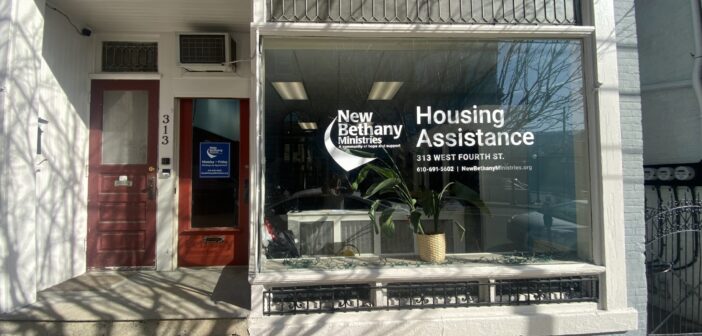When the pandemic hit a year ago, Alicia Creazzo, community school coordinator at Broughal Middle School, saw her role shift from overseeing various programs to working with families to help them meet their basic daily needs, particularly in regard to access to food, clothing and technology.
Now, Creazzo finds herself specifically focusing on housing support for families — something she does not specialize in and had limited experience working in.
As her role began to shift heavily toward housing in December 2020 and January 2021, Creazzo said she had to do a lot of digging to learn who qualifies for what types of assistance and resources.
Ranging from helping families find resources to help pay for rent to searching through apartment listings to locate affordable housing for homeless families living in local hotels, Creazzo’s role shift to assisting with housing has become increasingly necessary the past few months. And she’s not alone.
Jennifer Moll, social services director at New Bethany Ministries, said before the pandemic, New Bethany had one person working in homeless prevention.
An organization dedicated to helping those in need of support services in the Lehigh Valley, Moll said New Bethany now has a full office of five people allocated toward housing assistance.
In a typical year, Moll said New Bethany Ministries would receive around 40 applications for financial housing assistance. Since last July, Moll said they have gotten over 500—and they’re still counting.
Moll said New Bethany now receives five to seven housing assistance applications a day.
With many families struggling during the pandemic, coupled with a lack of affordable housing in the area and low turnover rates, housing assistance has become the forefront focus for Creazzo, Moll and other advocates in the South Bethlehem community.
“There are families we have established relationships with that have called upon us to help, there are families that have reached out in crisis and have no connection previously, but there are still other families that are fighting this battle on their own without our support,” Creazzo said. “I can’t even begin to put a number on it because I think there are still so many families we don’t know about.”
With the housing eviction moratorium set to expire on March 31, Creazzo said she feels evictions and homelessness in South Bethlehem are only going to increase over the coming months.
Creazzo said the moratorium, which protects families against eviction, is only available for those who are unable to pay rent due to COVID-19 and have exhausted all other financial assistance options.
It is unclear whether the current moratorium will be extended by the federal government before the end of the month. If it isn’t, Creazzo and Moll said evictions and homelessness in the area will get worse—fast.
“I think the current moratorium was very well intended and has helped a lot of people stay housed, but also people get longer and longer into debt,” Moll said. “We’re talking huge amounts of debt that is hard to get out from.”
Moll said the moratorium has created a bottleneck for those who are homeless in their quest to find affordable housing. Moll and Creazzo said not only is there a lack of available housing in the area, but affordable housing, in particular, is especially scarce.
With one-bedroom apartments in the South Bethlehem area being priced over $1,000 a month, Moll said most individuals and families struggling with their finances cannot afford to rent. Increased pricing is a problem she feels is exacerbated by, but not completely due to the pandemic.
John Ritter, deputy director for the Bethlehem Housing Authority, said he has seen a low amount of homelessness in the area during the pandemic due to the moratorium, which has led to a low turnover rate in housing.
“I think everyone’s just hunkered down for COVID and once they lift all the bans we’ll see a lot more movement, you might see a bit more of the homeless population,” Ritter said.
Ritter and Moll said while the spike in pricing may be positive for established homeowners, it can be an issue for those trying to rent.
Ritter said local housing is a “seller’s market” at the moment.
“Ones that are established I think are fine, it is the ones that are moving in because there’s just not a lot available, even buying private homes right now, it’s a very tough market, Ritter said. “There’s very few chances to buy a house.”
Ritter said New Bethany is the main resource the Bethlehem Housing Authority refers people to for housing assistance. To help combat homelessness in the community, New Bethany has recently received a $9.1 million grant under the federal CARES Act to help families who are facing eviction and need rent relief.
In order to qualify for funding under the grant, Moll said applicants must need assistance directly related to issues during the COVID-19 pandemic, whether that be because of a lost job, having to quarantine or having to stop working, for instance.
“The pandemic, it obviously has put more of a strain on (homelessness), and I think it has just put more eyes on it,” Moll said. “Now that it has put more eyes on it, we’re grateful people are starting to say ‘Hey, we need to provide assistance.’”
Moll said due to New Bethany’s location, they have been able to receive funds from both Lehigh and Northampton Counties, in turn helping a larger number of families.
While evictions have been lessened due to the moratorium and funding under grants such as the CARES Act, Creazzo said that has not stopped some landlords from trying to lease apartments for more money in an already saturated market.
“It seems like family’s leases are expiring, and the landlord knows that the housing market is really hot right now and they could potentially get more for their rentals, so we’re seeing our landlords not renewing leases for our families,” Creazzo said. “In that case they’re not protected by the moratorium.”
Moll said New Bethany has focused on building relationships with landlords, such as hosting landlord roundtables every two or three months, to give themselves a “chance” when advocating for a client who may be behind on rent.
Ultimately, Moll said she knows landlords are also dependent on rent being paid so they can pay their own bills as well.
Even if the eviction moratorium is extended before the end of the month, Creazzo said evictions and homelessness will eventually increase regardless. With the families she works with, the inability to pay rent is already a problem.
“When there are evictions of families, you may see more affordable housing options coming onto the market, but that means then that somebody else is without…It’s just going to be a vicious cycle,” Creazzo said.






Comment policy
Comments posted to The Brown and White website are reviewed by a moderator before being approved. Incendiary speech or harassing language, including comments targeted at individuals, may be deemed unacceptable and not published. Spam and other soliciting will also be declined.
The Brown and White also reserves the right to not publish entirely anonymous comments.
1 Comment
A situation that will only be made worse by the 1,000’s of people coming through our southern border and who will be sent out into our communities in need of every service available.